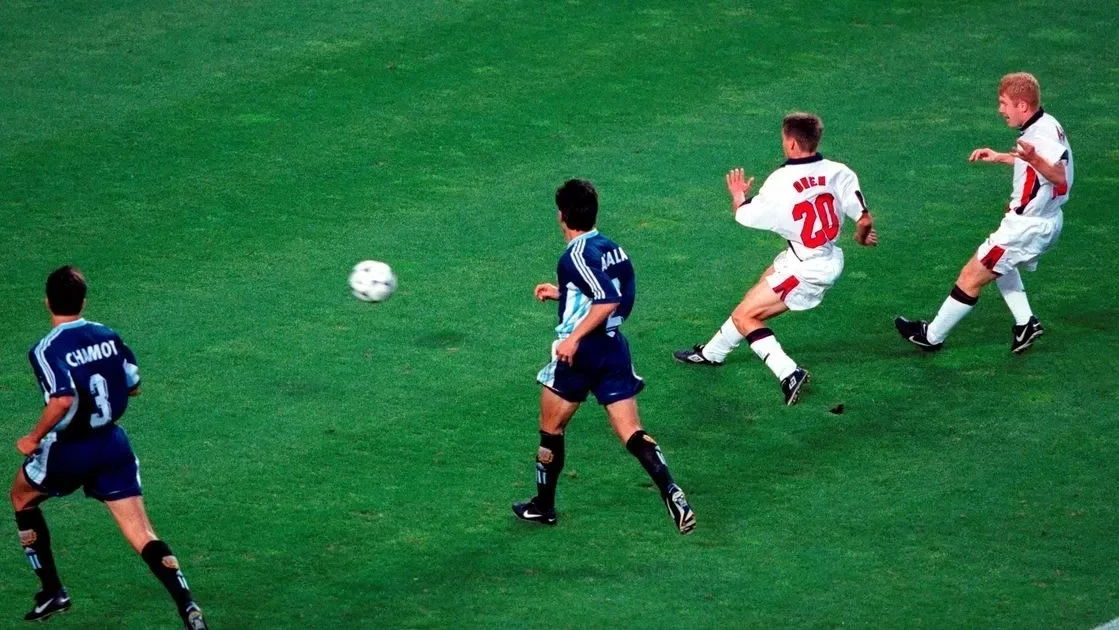For us football fans, major international tournaments are sacred biennial events; for the gambling industry, they are the golden ticket to exploit more people and make more money.
Words by Tom Fleming
Something special
There’s always something special in the air during the Euros and World Cup, even when the home nation sides inevitably go on to get knocked out.
As a nation, we collectively look forward to these tournaments with an expectant sense of purity not reserved for the league season. Free of tribal club rivalry, we come together to embrace and enjoy the beautiful game for what it is.
I’m talking about a fresh-faced Michael Owen, waltzing his way past half the Argentinian team, West Brom’s Hal Robson-Kanu executing the perfect Cruyff turn, that Archie Gemmill goal and melodic renditions of ‘Will Grigg’s on fire’ carrying on long into the night.
Thankfully, these wonderful international moments aren’t tarnished by players plastered head to toe in gambling-sponsored kits. Sadly, that’s where the good news ends.

Fertile ground
When you consider the sheer volume of live games shown on terrestrial TV during tournaments – up to three a day during the group stages – it almost goes without saying that international tournaments provide fertile ground for the gambling industry to exploit. During 2018 World Cup, nearly half of all UK gamblers intended to watch every single game.
Prior to tournament, William Hill had a 22% increase in marketing spend, and launched new markets like score casts and micro-betting one-minute markets. They also had 100 self-service betting terminals installed in high-street bookmakers ahead of the tournament.
During international tournaments, all games are televised live, split between ITV and the BBC, with only ITV showing commercial adverts. A study found that ITV ran 90 minutes (172 ads) of gambling adverts during its 2018 World Cup coverage – equivalent to 17% of all the ads it showed. Almost every commercial break contained at least one gambling ad, sometimes two.
Games – and accompanying gambling adverts – are broadcast throughout the day, kicking off as early as midday, long before the 9pm watershed, rendering the whistle-to-whistle ban (meant to stop children from seeing gambling adverts) redundant.

Complaints and concerns
Gambling ads during international tournaments are, as ever, unpopular with the public. The Advertising Standards Authority (ASA) received 115 complaints about gambling adverts during the 2018 World Cup, an increase of 468% on the previous 4-week period. The complaints were mostly about the sheer volume of ads, but also about specific ads that encouraged viewers to act quickly, i.e., ‘bet now’.
The ASA said: “The majority of the complaints we have received during the World Cup are about the amount/volume of gambling ads that appear as well as concerns that betting and gaming ads should not be scheduled around programmes when children are watching,”
Even Gillian Wilmot, chairman of the Senet Group, a body formed by William Hill, Ladbrokes, Coral and Paddy Power to address public concerns about the perception of gambling said: “There is widespread unease in the gambling industry at the volume and density of gambling adverts around live sport, but it is difficult to reduce this in a competitive market unless government decides to act”. William Hill also told Radio 4 that it would like to see greater controls on advertising.
These comments are an admission on behalf of the gambling industry that adverts do in fact cause harm. If the industry, which makes huge profits off the back of such ads, are worried about the volume of advertising, then just how concerned should we be?

Problematic profit
FIFA research into over gambling sites worldwide indicated that the industry took around £111 billion in bets throughout the tournament – equivalent to almost £15 from every person on the planet. On average, about £1.7 billion was bet on every game across the globe, with the final taking in £5.9 billion in bets.
In the UK, £2.3 billion was bet across the entire tournament – more than twice as much as during the 2014 World Cup. An estimated £20 million was bet on England’s first game of the tournament, against Tunisia. William Hill made £32.8 million from the tournament, with Paddy Power Betfair Plc and Bet365 reporting a 13 and 9.7% year-on-year increases respectively.
Research tells us that one in four gamblers suffer, or are starting to suffer, significant harm, and the proportion of income spent on gambling, not the overall amount, is the primary determinant of harm. Therefore, a significant increase in gambling profit, by definition, simply cannot happen without an increase in gambling harm. When you consider that William Hill had over 1 million active online customers throughout the 2018 World Cup, the scale of the problem begins to become apparent.
It’s important to remember that the gambling industry actively relies on addiction, which is partially cultivated and encouraged through advertising, with between 60 and 87% of profit coming from just 5% of gamblers. The industry’s rise in profits during the last tournament was fuelled, in part, by a frenzy of adverts and marketing.

With the postponed Euro 2020 Championships due to take place this summer, The Big Step is calling on all broadcasters, including ITV, to suspend all gambling advertising during the Championships. Given the year we’ve all had, we think the country deserves to be able to enjoy the Euros without being constantly bombarded by gambling adverts and marketing.
This advertising is harmful – even the industry has suggested so – and it detracts from the enjoyment and the spectacle of what should remain a sacred event for us fans.
Support our campaign
– Add your name to our petition calling for an end to harmful gambling advertising


